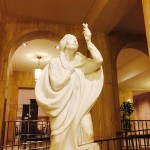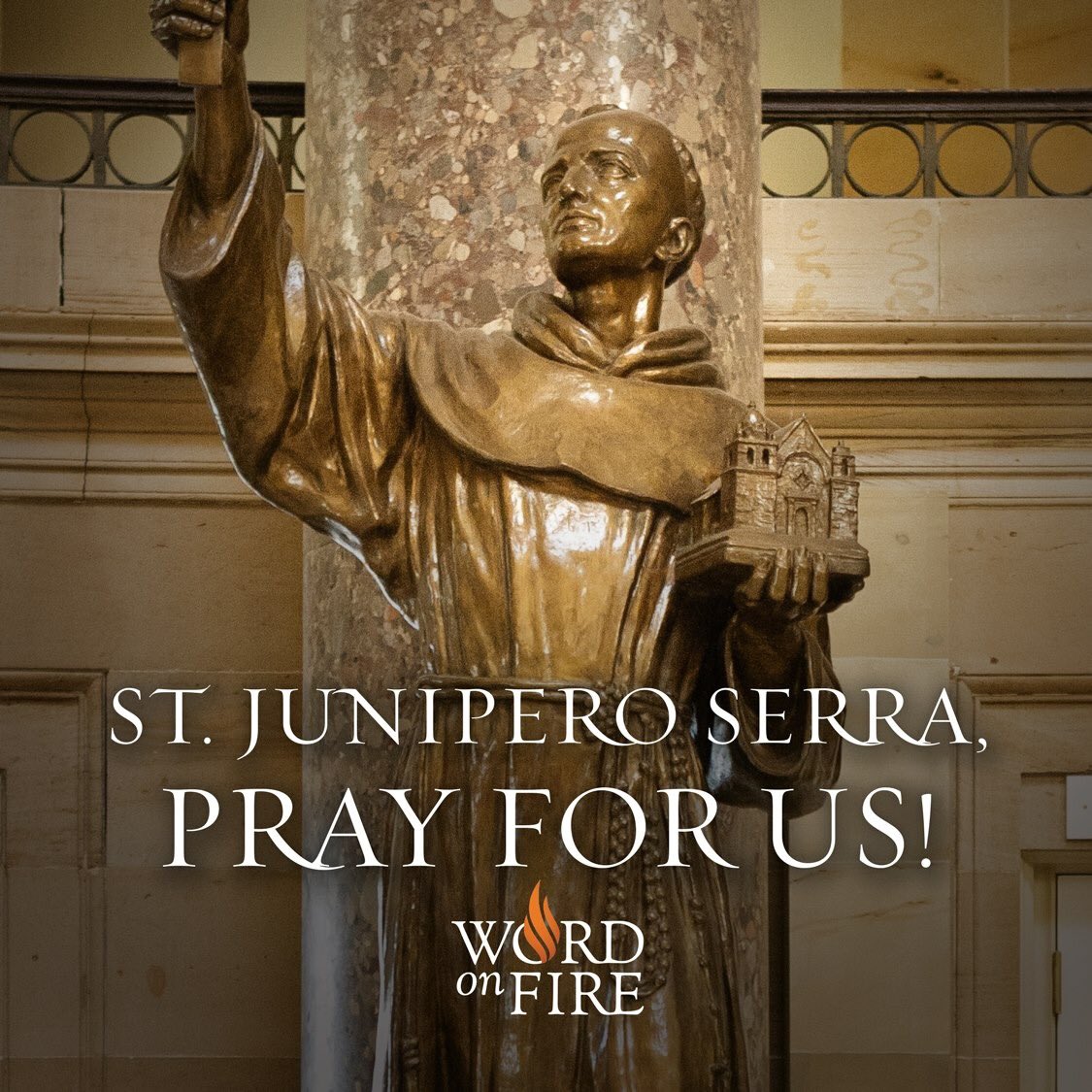1.
We honour Saint Benedict today whose holy rule continues to inspire people to come closer to Christ. pic.twitter.com/LpdhyCWdCs
— Fr. Patrick Brennan (@Pathound) July 11, 2015
2. Pope Benedict XVI on his patron:
In contrast with a facile and egocentric self-fulfillment, today often exalted, the first and indispensable commitment of a disciple of St Benedict is the sincere search for God on the path mapped out by the humble and obedient Christ, whose love he must put before all else, and in this way, in the service of the other, he becomes a man of service and peace. In the exercise of obedience practiced by faith inspired by love, the monk achieves humility, to which the Rule dedicates an entire chapter. In this way, man conforms ever more to Christ and attains true self-fulfillment as a creature in the image and likeness of God.
…
Benedict describes the Rule he wrote as “minimal, just an initial outline”; in fact, however, he offers useful guidelines not only for monks but for all who seek guidance on their journey toward God. For its moderation, humanity and sober discernment between the essential and the secondary in spiritual life, his Rule has retained its illuminating power even to today. By proclaiming St Benedict Patron of Europe on 24 October 1964, Paul VI intended to recognize the marvelous work the Saint achieved with his Rule for the formation of the civilization and culture of Europe. Having recently emerged from a century that was deeply wounded by two World Wars and the collapse of the great ideologies, now revealed as tragic utopias, Europe today is in search of its own identity. Of course, in order to create new and lasting unity, political, economic and juridical instruments are important, but it is also necessary to awaken an ethical and spiritual renewal which draws on the Christian roots of the Continent, otherwise a new Europe cannot be built. Without this vital sap, man is exposed to the danger of succumbing to the ancient temptation of seeking to redeem himself by himself — a utopia which in different ways, in 20th-century Europe, as Pope John Paul II pointed out, has caused “a regression without precedent in the tormented history of humanity.” Today, in seeking true progress, let us also listen to the Rule of St Benedict as a guiding light on our journey. The great monk is still a true master at whose school we can learn to become proficient in true humanism.
3.
May St Benedict pray for Europe and all @Scouts_Europe
https://t.co/uo9gGnC9in
— Fr Lawrence Lew OP (@LawrenceOP) July 11, 2015
4. My recent chat with an American Benedictine monk in St. Benedict’s hometown. Some of the discussion was about St. Benedict, as you might imagine it would be:
LOPEZ: How important is Saint Benedict to the life of you and your brothers? How important should he be in the lives of all Christians?
FR. CASSIAN: Saint Benedict is an extraordinary teacher and guide. He’s wise. He knows human nature, so he can’t be fooled. He is both loving and strict, compassionate and demanding. His Rule is truly remarkable. In the life of all Christians, how we long for wise guides, how we need a rule of life! There’s a whole body of contemporary literature on applying the teaching of Saint Benedict to ordinary life.
LOPEZ: You’ve referred to Saint Benedict as the patron saint of the ordinary. How can people outside the monastery be made holy in the ordinary things of life?
FR. CASSIAN: Saint Benedict admonishes the cellarer to treat the tools of the monastery as though they were the sacred vessels of the altar. How profound that is! It means that material things have a sacramental meaning, and point beyond themselves to God, to divine realities. In our culture, we’re accustomed to being stimulated all the time, especially by television and the Internet; for that reason we look for excitement. Saint Benedict is not interested in excitement. In fact, we deliberately strive to reduce sensory input in the monastery, precisely so that we can see ordinary life not as something boring, but as the sacramental communication of God’s presence.
More here.
5. From @DigitalNun, a Benedictine in Europe:
For myself, I’d say that we never had more need of the monastic quest for God; for perseverance in prayer; and for the kind of creative scholarship and activity that a dedicated life of prayer and service can produce. But I’d go further. If we speak of institutions, the one European unity that has subsisted throughout the centuries is the unity of the Catholic Church. That in itself should make us think. It may not be popular to say so, but without the Christian religious basis of Europe — a basis St Benedict did much to strengthen — we are surely in danger of reverting to barbarism. And the world has enough barbarians already.
6. From his Rule:
Whenever you begin any good work you should first of all make a most pressing appeal to Christ our Lord to bring it to perfection; that he, who has honored us by counting us among his children, may never be grieved by our evil deeds. For we must always serve him with the good things he has given us in such a way that he may never—as an angry father disinherits his sons or even like a master who inspires fear—grow impatient with our sins and consign us to everlasting punishment, like wicked servants who would not follow him to glory.
So we should at long last rouse ourselves, prompted by the words of Scripture: Now is the time for us to rise from sleep. Our eyes should be open to the God-given light, and we should listen in wonderment to the message of the divine voice as it daily cries out: Today, if you shall hear his voice, harden not your hearts; and again: If anyone has ears to hear, let him listen to what the Spirit is saying to the churches. And what does the Spirit say? Come my sons, listen to me; I will teach you the fear of the Lord, Hurry, while you have the light of life, so that death’s darkness may not overtake you.
And the Lord as he seeks the one who will do his work among the throng of people to whom he makes that appeal, says again: Which of you wants to live to the full; who loves long life and the enjoyment of prosperity? And, if when you hear this you say, I do, God says to you: If you desire true and everlasting life, keep your tongue from evil and your lips from deceit, turn away from evil and do good; seek peace and pursue it. And when you have done these things my eyes will be upon you and before you call upon my name I shall say to you: Behold, I am here. What could be more delightful, dearest brothers, than the voice of our Lord’s invitation to us? In his loving kindness he reveals to us the way of life.
And so, girded with faith and the performance of good works, let us follow in his paths by the guidance of the Gospel; then we shall deserve to see him who has called us into his kingdom. If we wish to attain a dwelling-place in his kingdom we shall not reach it unless we hasten there by our good deeds.
Just as there exists an evil fervor, a bitter spirit, which divides us from God and leads us to hell, so there is a good fervor which sets us apart from evil inclinations and leads us toward God and eternal life. Monks should put this fervor into practice with an overflowing love: that is, they should surpass each other in mutual esteem, accept their weaknesses, either of body or of behavior, with the utmost patience; and vie with each other in acceding to requests. No one should follow what he considers to be good for himself, but rather what seems good for another. They should display brotherly love in a chaste manner; fear God in a spirit of love; revere their abbot with a genuine and submissive affection. Let them put Christ before all else; and may he lead us all to everlasting life.
7. He’s helping Elizabeth Scalia.
8. St. Gregory the Great on St. Benedict.
9. From Pius XII’s encyclical on the saint of the day:
In such a mighty storm and universal upheaval, from where did hope shine? Where did help and protection arise in order to save humanity and what was left of its treasures from shipwreck? It came from the Catholic Church. All earthly institutions begun and built solely on human wisdom and human power, in the course of time succeed one another, flourish and then quite naturally fail, weaken and crumble away; but the organization which Our Redeemer established has received from its divine Founder unfailing life and abiding strength from on high. Thus sustained and fortified the Church comes out victorious through the hostile fortunes of time and circumstances; amid their ruins and failures it is capable of molding a new and happier age and with Christian doctrine and spirit she can build and erect a new society of citizens, peoples and nations.
10. Fr. Dwight Longenecker on his “Little Way.”
11. “Begone Satan! Never tempt me with your vanities! What you offer me is evil. Drink the poison yourself!” About the St. Benedict medal.
By the way: St. Benedict Press has been publishing some beautiful books lately, including this one on spiritual warfare.
12. See #3 about a blessed night with his sister, St. Scholastica; “Their minds had always been united in God…”
13. Some prayers, including a litany.
14. Fr. Steve Grunow:
The culture should not see in the Church merely a mirror image of itself or consider the Church a sanctioning body for its aspirations and goals. Instead the culture should see in the Church a different way- a way that engages the culture in its unique identity and mission and imbues the cultural milieu with things ancient and ever new. This way of life is the way that leads to people to the Church, and through the Church to Christ, and does so in ways that challenge people with a radical witness to Gospel.
This radical witness is exemplified in lives of sacrifice and service, to Christ and to our neighbor, and even beyond this, in forgiveness for those who have wronged us and prayers for those who have persecuted us.
Can we become this for others, for the culture? Can we display, in our own witness to Christ, in the midst of our culture, what St. Benedict displayed to his?
15. Saint Benedict, pray for us!












